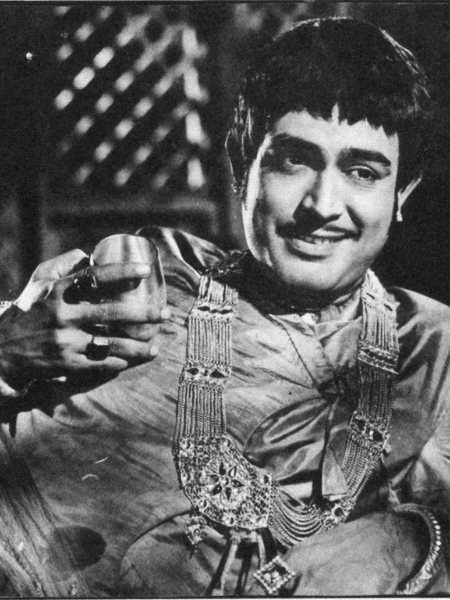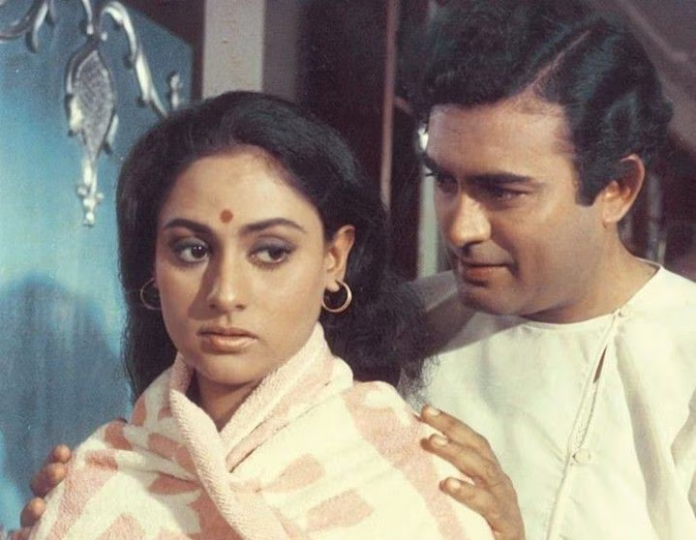From a nobody to one of the most versatile and respected actors of all time, it is a story of courage, resilience, fighting against the odds of life, and triumph. The tale of Sanjeev Kumar is not an ordinary one; be it his struggle, his success, his love life or lack thereof, or even his untimely end, every chapter of his life remains extraordinary.
Early Life and The Struggles

Sanjeev Kumar was born as “Harihar Jethalal Jariwala” on July 9, 1938, in Surat, Gujarat, into a large, lower-middle-class Gujarati family. His father’s name was Jethalal Jariwala, and his mother’s name was Shantaben Jariwala. He had two younger brothers, Kishore Jariwala and Nakul Jariwala, and a sister, Leela Jariwala, who also ventured into acting.
Harihar was interested in theatre from his school days and dropped out of school to join the Indian National Theatre in Bombay. He then joined the Filmalaya Acting School and learned under P.D. Shenoy, who was the acting coach.
Reportedly, during his Indian National Theatre days, future filmmaker Sawan Kumar Tak gave him the screen name Sanjeev Kumar. He made his screen debut in 1960 with a small role in “Hum Hindustani,” followed by another small role in “Aao Pyar Karen (1960).”
It was a period of great struggle for him as he tried to meet ends; often, he went without food. It was a time when he did not have the funds for travel or a decent pair of clothes. Atlast got his first film as a hero, a low-budget film “Nishan (1965),” directed by Aspi Irani, but for him, it was a new lease of life. He followed it with a few more B-grade films like “Badal (1966),” “Alibaba and 40 Thieves (1966),” Pati Patni (1966),” “Husn Aur Ishq (1966),” “Smuggler (1966),” “Gunehagar (1967),” “Aayega Aanewala (1967),” “Mitti Ka Dev (1968),” and “Raja Aur Runk (1968),” which were popular with the front benchers.
The Struggle and Triumph
In 1968, H. S. Rawail’s cast him in “Sunghursh, with actors like Dilip Kumar, Balraj Sahni, and Jayant. In the film he had a small role as Dwarka, brother of Balraj Sahani. His intensity and comand made this small role memorable. After Sunghursh, he went on to do many big films where he had smaller roles, like Naunihal (1967), Saathi (1968), Gauri (1968), Aashirwad (1968), Shikar (1968), Bandhan (1969), Satyakam (1969), Jeene Ki Raah (1969), and Dharti Kahe Pukar Ke (1969).
In 1968, he starred in Asit Sen’s Anokhi Raat, with Zaheeda Hussain and Tarun Bose. The film was a critical and commercial success and established him as a leading man. The film had memorable songs like “Oh Re Taal Mile,” “Mahalon Ka Raja Mila,” “Mile Na Phool To,” and “Dulhan Se Tumhara Milan Hoga.” The same year, he starred in Atma Ram’s Shikar with Dharmendra and Asha Parekh. Sanjeev get the Filmfare Best Supporting Actor Award nomination for his performance. Some other acclaimed films of his early career include “Oos Raat Ke Baad (1969), “Jyoti (1969),” “Chanda Aur Bijli (1969),” “Sachaai (1969), and “Bombay by Nite (1969),” among others.

Sanjeev Kumar – The Star – Actor
In 1970, “Khilona” opposite Mumtaz, where his portrayal of an insane man established him as a big star and even bigger actor. For his performance, he get a nomination for the Filmfare Best Actor Award.
The same year, he starred in Rajinder Singh Bedi’s “Dastak,” opposite Rehana Sultan. Both the leads went on to get the National Award for Best actor and Actress for the film. Besides its story and performances, the film also remembered for its soulful music by none other than Madan Mohan. Madan Mohan won the National Film Award for Best Music Direction. The film has songs like “Baiyan Na Dharo,” “Hum Hain Mata-e-koocha-o-bazaar,” “Mai Ri Main Kase Kahoon,” and “Tumse Kahoon Ek Baat.”
In 1971, he starred opposite Tanuja in Basu Bhattacharya‘s “Anubhav,” which won the National Award for Second Best Feature Film. In 1972, his friend and long-time collaborator Gulzar cast him as Jaya Bhaduri’s father in “Parichay,” a really brave choice for an actor in his 30s.
The same year, he starred opposite Jaya Bhaduri in Gulzar‘s “Koshish.” The film explores the every-day struggles of a of a deaf and mute couple. In the film, Jaya and Sanjeev delivered performances that were both heartbreaking and inspiring. Without a single spoken word, they communicated their characters’s emotions and struggles. Kumar gets his second National Best Actor Award for the performance.
Some other successful films of his career include Seeta Aur Geeta (1972), Manchali (1973), Anhonee (1973), Anamika (1973), Aap Ki Kasam (1974), Manoranjan (1974), Shaandaar (1974), Naya Din Nai Raat (1974), Charitraheen (1974), and Faraar (1975), among others.
The Name is Versatility
1975 was the year when he had releases like “Sholay,” Gulzar’s “Aandhi,” and “Mausam.” In Ramesh Sippy’s Sholay, he played an old man, “Thakur Baldev Singh,” which went on to be one of his most celebrated performances.
In Gulzar’s “Aandhi,” he again played an older man opposite Suchitra Sen. The film is a sensitive portrayal of the life of a politician who leaves her husband for her political ambitions and has a chance meeting with him, which rekindles their love. Sanjeev Kumar won another Filmfare Best Actor award for the film.


Another standout performance of his career came in “Mausam,” directed by Gulzar. The film was heartbreaking tale of a man plagued by his own guilt for leaving the woman who loved him. The woman later going mad and died, leaving a daughter who became a prostitute. The performance earned him another nomination for the Filmfare Best Actor Award. His next was Ravi Tandon’s “Zindagi (1976),” which earned another Filmfare Best Actor nomination. The same year, he acted in Hrishikesh Mukherjee in “Arjun Pandit” with Ashok Kumar, Vinod Mehra, and Bindu. Kumar won the Filmfare Best Actor Award for his performance.
Sanjeev Can Do Anything
In 1977, he got the chance of his life to work with the great Satyajit Ray in “Shatranj Ke Khiladi,” which went on to become a classic. He also starred in the philosophical “Yehi Hai Zindagi,” which earned him another Filmfare Best Actor nomination. In 1978, he played elderly father of Amitabh Bachchan and Shashi Kapoor in “Trishul.” The same yaers he played the flirtatious husband in “Pati Patni Aur Woh.”
In 1982, two of his most important films released, both with Gulzar. First was “Angoor (1982), with Maushumi Chaterjee and Dene Verma, an adaptation of The Comedy of Errors by Shakespeare. Second wad “Namkeen (1982), an adaptation of the story “Akal Basanta” by Bengali writer Samaresh Basu. Namkeen also strred Waheeda Rahman, Sharmila Tagore and Shabana Azmi. Both films are now considered cult classics. His double role in ‘Angoor’ is listed among the 25 best acting performances in Indian cinema.
Some other notable films of Sanjeev Kumar include Immaan Dharam (1977), Dhoop Chhaon (1977), Paapi (1977), Trishna (1978), Devata (1978), Tumhare Liye (1978), Swarg Narak (1978), Hamare Tumhare (1979), Jaani Dushman (1979), Griha Pravesh (1979), Kaala Patthar (1979), Nauker (1979), Be-Reham (1980), Abdullah (1980), Hum Paanch (1980), Ladies Tailor (1981), Silsila (1981), Haathkadi (1982), Suraag (1982), Khud-Daar (1982), Vidhaata (1982), Shriman Shrimati (1982), Hero (1983), Bad Aur Badnam (1984), Lakhon Ki Baat (1984), Ram Tere Kitne Naam (1985), Zabardast (1985), Qatl (1986), Kaanch Ki Deewar (1986), Love and God (1986), and many more.
Perosnal Life
He remained a bachelor throughout his life, a decision that stemmed from personal choice rather than circumstance. His relationships, though few, were profound and impactful. He proposed to Hema Malini in 1973, but she declined it. This, however, did not deter him from maintaining a lifelong friendship with her.
There were tabloid rumors of his linkup with veteran actress Nutan.There is a famous story of Nutan slapping him when she found out that he himself was behind the rumor of their affair, although we dont verify the story.
His most famous linkup was with Sulakshna Pandit. Sulakshan was madly in love with him and openly expressed her affection. She even proposed marriage, which he respectfully declined.

Legacy of Sanjeev Kumar
Sanjeev Kumar’s legacy is that of a superstar who could portray the common man with as much ease as he could essay larger-than-life characters. His untimely demise on November 6, 1985, at the age of 47 due to a cardiac arrest left a void in the Indian film industry that is felt to this day.
Sanjeev Kumar, known for his unparalleled contribution to Indian cinema, led a life that was as intriguing off-screen as it was on-screen. Sanjeev Kumar was affectionately known as Haribhai within his close circles. Despite his stardom, Sanjeev Kumar’s personal life was marked by simplicity and a sense of solitude.
Sanjeev Kumar’s untimely demise left many unanswered questions about his personal life. He was known to have a close bond with his family. He especially was very close his mother, who was keen on seeing him settle into matrimony. Despite her efforts and the societal expectations of the time, Sanjeev Kumar chose to remain single. He focused on his craft and the characters that would immortalize him in the history of Indian cinema.
Sanjeev Kumar on IMDB














Leave feedback about this